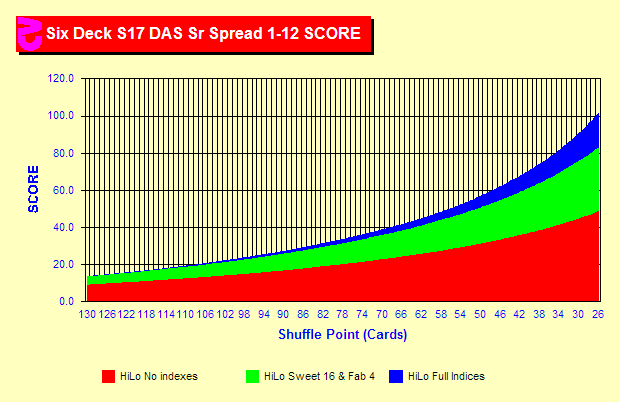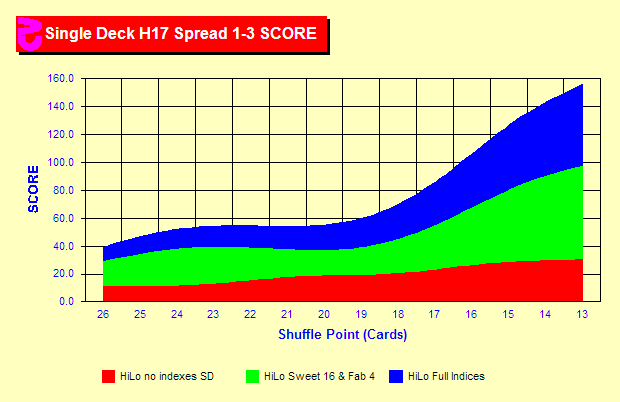|
|
SCOREs with Different Indexes
 How
much do card counting indexes matter? How
much do card counting indexes matter?
Here we will use the same chart as on the previous page, but we
will vary the number of indexes used. Red indicates the SCORE using
no indexes at all including no Insurance. Green adds the top 20
indexes. This is Don Schlesinger's Illustrious 18 and Fabulous 4
Surrender indexes minus the ten splits which few players use these
days. Blue indicates the gain in SCORE using over 100 indexes. At
very poor penetration on the left of the chart, we can see that
the top 20 indexes perform nearly as effectively as 100+ indexes.
There is almost no blue gain. At low penetration all those extra
indexes just don't help. The middle of the chart displays more common
penetrations. Here the top 20 indexes still provide the vast majority
of the gain of 100+ indexes. At deep penetrations at the right of
the chart, the picture changes. The top 20 indexes still give us
the majority of gain. But now we see a substantial additional gain
from additional indexes. The great range of possible counts near
the end of the shoe is behind this gain.
|
 What
about single-deck? What
about single-deck?
Let us look at the same subject but with single-deck, one player
and a bet spread of only 1 to 3 units. This chart is significantly
different. The top 16 indexes displayed in green still provide the
majority of the gain. But the additional blue indexes are substantially
more important at low and medium penetrations. Peter Griffin in
The Theory of Blackjack discusses the importance of playing
strategy in single-deck games. Also note that the SCORE curve does
not accelerate upward in single-deck as it does in six decks above.
In this chart, a cut card was used. The actual number of cards dealt
is higher than the number of cards before the cut card because you
don't shuffle until the round ends. Because the number of rounds
changes as penetration increases, the number of actual cards dealt
does not have a linear relationship to the number of cards after
the cut card. This causes the changes in the curve. This effect
is not seen with six decks because there are far more rounds. It
also does not appear in single-deck if a cut card is not used. The
cut card effect will be discussed further on a later page.
|
|
Sim details
- Six decks, S17, DAS, LS, Heads-Up, Hi-Lo, truncate, half-deck
resolution, penetrations from 26-130 cards cutoff by the card,
optimal betting
- Single Decks, H17, Heads-Up, Hi-Lo, truncate, quarter-deck resolution,
penetrations from 26-130 cards cutoff by the card, optimal betting
- Three sets of indexes
- Two billion rounds each
|
|
|